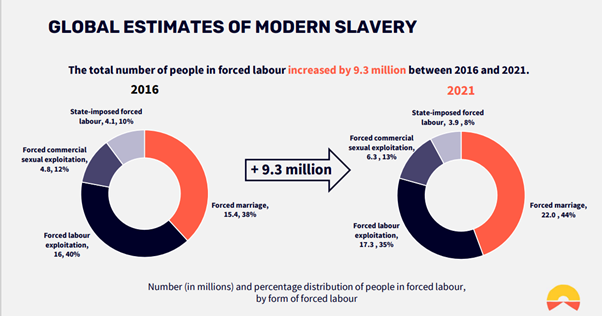The Global Slavery Index announced a few weeks ago that the number of people living in situations of modern slavery on any given day has increased to 49.6 million, victims of modern slavery are either forced to work against their will or in a marriage that they were forced into.

Source: Walk Free
The utilities sector is in the spotlight for several reasons, such as climate change and the cost-of-living crisis. These related crises are adding complexity to the supply chains of companies in the utilities sector which increases modern slavery risk.
For example, the increased demand for renewable energy has revealed a number of resources being sourced from high-risk geographies. Resources such as polysilicon, a key component in solar panels, is made in the Xinjiang Uyghur Region of China known for forced labour and the cobalt used in batteries is mined from the Democratic Republic of Congo known for child labour.
And the cost-of-living crisis and migration due to ongoing conflict and climate change is creating more vulnerabilities to forced labour and human trafficking such as the use of migrant, temporary and sub-contracted workers for the construction of utilities infrastructure and facilities management of utilities operations.
So what should the utilities sector do to address these issues?
Mapping the operations and supply chains of utilities organisations can help to identify the areas most at risk of modern slavery. Once these areas have been mapped, prioritise those which have the highest likelihood of modern slavery risk to ‘deep dive’.
Modern slavery risks are typically hidden beyond tier 1 suppliers, a deep dive and more detailed mapping will help to increase transparency and better identify risks. This process should be done through consultation with relevant stakeholders who can bring on the ground and contextual insights.
Educate staff, across all different roles and levels and your supply chain on the risks, spotting the signs, actions to take and where to get help. The Supply Chain Sustainability School has lots of free resources to support you with this.
In order to truly combat modern slavery focus needs to be given to prevention and remediation. With prevention, look at where your organisation could potentially be causing modern slavery, for example, long payment terms, low wages, last minute cancellation or changes to orders. With remediation, put real people at the heart of your strategy. Seek guidance from those with first hand experience and monitor the effectiveness of your remediation strategy on an ongoing basis.
On all the above and more, collaboration is key. Organisations within the utilities sector often have similarities in their business models and supply chains and therefore share many modern slavery risks and consequently opportunities to create impact. Many utility companies have come together to create the ‘Utilities Against Slavery Initiative, which is designed specifically to address the issue of collaboration and provide a common voice for the industry.
Interested in how we can help your organisation with your modern slavery strategy? Get in touch with our expert Anna here.
Explore how the healthcare industry can fight against modern slavery.
Discover how the built environment can fight against modern slavery.

Anna Cantwell
Senior Consultant
anna@actionsustainability.com

This was posted in All Topics, Modern Slavery & Human Rights
Lead Consultant Helen Carter, uncovers how organisations are integrating sustainability considerations, stakeholder engagement, and innovative methodologies to identify, assess, and prioritise sustainability risks.
Read Article
This was posted in All Topics, Modern Slavery & Human Rights
Senior Consultant EJ Allen explores the critical role of modern slavery due diligence in strengthening supply chain resilience. Explore the risks posed by forced labor and exploitation, the legal compliance requirements, risk mitigation strategies, and the importance of reputation management.
Read Article
This was posted in Modern Slavery & Human Rights
Social audits are a key component of most modern slavery due diligence processes. Senior Consultant, Anna Cantwell uncovers how effective audits, worker engagement, and collaboration can contribute to building resilient and ethical supply chains.
Read Article